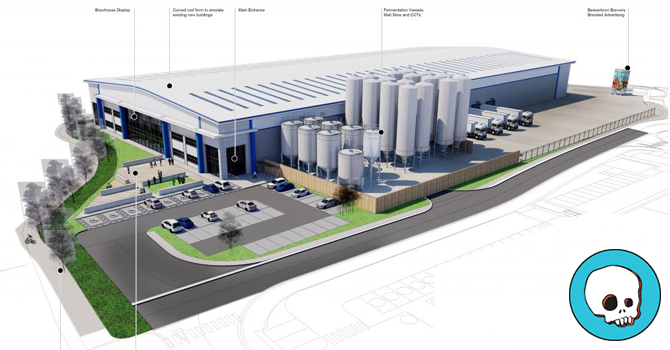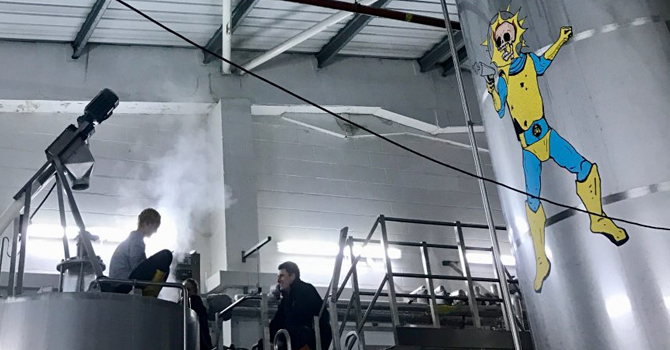
London’s Beavertown Brewery today announced that Heineken International B.V. would acquire a minority stake in the company, confirming a month-long rumor that the craft beer company was on the hunt for an investment partner.
Terms of the deal, including the amount and the specific size of the stake sold, were not disclosed.
A May report from Mergermarket, citing unnamed sources who were familiar with the transaction, suggested that a potential deal could be worth more than $133 million for up to a 50 percent stake in the brewery.
As part of the deal, which closed yesterday, Beavertown will be able to tap into upwards of $55 million of growth capital to build a new 450,000-hectoliter (383,000 barrels) brewery, which is dubbed “Beaverworld” and slated to open in late 2019, the company wrote on its website.
“This is about ambition,” Beavertown founder Logan Plant, son of Led Zeppelin frontman Robert Plant, wrote on the company’s blog. “I am driven to take myself, our team and the brewery to new levels. I truly believe this is a once in a lifetime opportunity, which we as a team have worked so hard to create for ourselves.”
Beavertown is also planning to open a small brewery at the site of the new Tottenham Hotspur football stadium.
For its part, Heineken said it was “honoured” that Beavertown had “chosen to collaborate” with a company that distributes more than 300 beers and ciders to 190 countries.
“We love what they’re doing and are excited to be able to help them do more,” a Heineken spokeswoman wrote to Brewbound. “Our minority investment means they can make their dream of Beaverworld a reality and get their fantastic beers into the hands of even more drinkers.”
Heineken’s minority investment in Beavertown follows recent deals with Belize Brewing Company, London’s Brixton Brewery, and California’s Lagunitas Brewing, which it now wholly-owns.
Plant, who wrote a lengthy blog post about the process of bootstrapping Beavertown from his kitchen stove to its current 45,000-hectoliter facility in Tottenham Hale, London, said the company spent seven months examining other investment options, including crowdfunding and private equity, which ultimately proved to be incompatible.
“The more we looked at the offers, it became clear that it was only an option for the short to medium term,” Plant said of a potential deal with a private equity firm. “Private Equity groups offered the cash, but across the board, private equity seemed to be driven by maximising return on investment ASAP. Investors from these financial houses are not in it for the long run, or for the love of the product or industry they are investing in.”

Citing concerns of being forced to make the “wrong decisions” as a result of a private equity firm’s desire to scale quickly and drive faster returns, Plant said the “most sensible and stable option” was to link up with a strategic partner.
“In choosing Heineken, we’ve met the criteria we set ourselves and that were important to us as a company and a team,” Plant wrote, noting that the company met with a number of “small, medium and large” brewing company from “all over the globe.”
Plant, who will remain CEO, described the partnership with Heineken as an “arm’s length” deal that will enable Beavertown to “retain full control” of its “destiny.”
“We do have the option to dip into their resources but again, it is strictly only if we want to,” he wrote.
Today’s announcement from Plant was similar to the strategy Lagunitas founder Tony Magee used in 2015 when he took to a personal Tumblr page to explain his rationale behind selling 50 percent of his company to Heineken.
Both Magee and Plant, who had been publicly critical of “big brewers” prior to their respective deals with the Dutch company, stressed the familial nature of Heineken’s corporate ownership structure.
“In my mind only one brewer stood out as truly global, family-owned and still brewers first; Heineken,” Magee wrote in 2015. “We talked with a few others but there was really only one relationship that seemed acceptable.”

Plant, who noted that he spoke to Magee prior to inking the deal, also wrote about how important Heineken’s “fourth generation family leadership” was in his decision-making process.
“I spoke at length to Lagunitas founder Tony Magee and have seen that Heineken gave him and his team the space and the right kind of support to crack on without impacting on how they do things as a brewery,” he wrote. “That gives me confidence to partner with a family business that takes a long-term view and has continuously adapted and innovated for over the last 150 years.”
In addition to their business ties with Heineken, Magee, and Plant also now have something else in common: Their beers will no longer be served at bars owned by Scottish brewery BrewDog, which itself sold a 22 percent stake, valued at $265 million, to private equity firm TSG Consumer Partners.
We will no longer be selling Beavertown beers or attending Beaver Ex. I wrote this piece in 2015 but it seems very relevant today too https://t.co/36Jn93MRI3
— James Watt (@BrewDogJames) June 21, 2018
We will no longer be serving @lagunitasbeer in any of our bars.
— James Watt (@BrewDogJames) September 9, 2015
Arlington Capital, which has worked with a number of craft brewing companies to secure deals with strategic and private equity firms alike, advised Beavertown Brewing in the transaction.
Arlington also worked with Michigan’s Short’s Brewing in its 20 percent sale to Lagunitas U.S. Holdings (LUSH), a wholly-owned subsidiary of Heineken International, in July 2017, as well as with BrewDog in its minority sale to TSG that April.
Additional information is available on Beavertown’s website.
